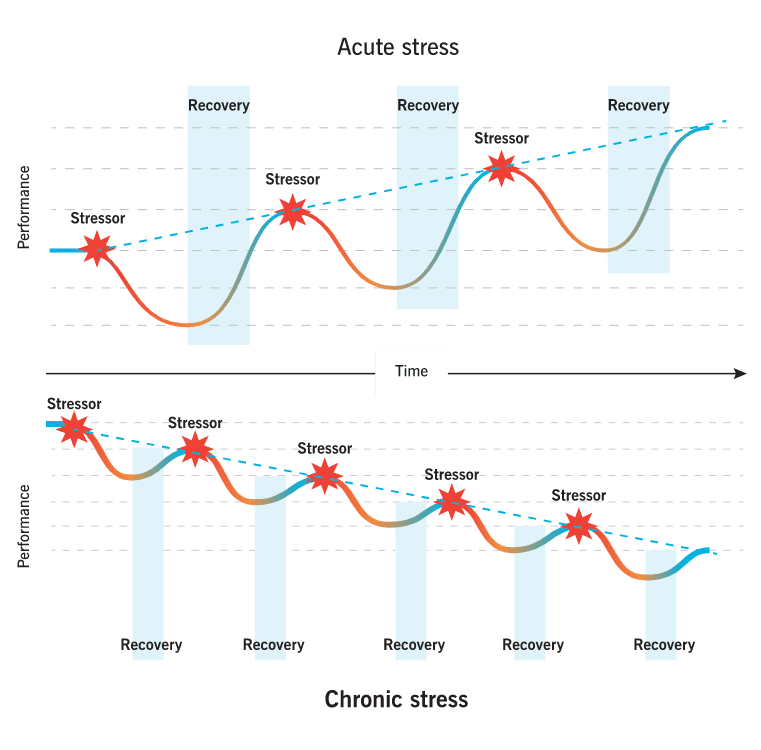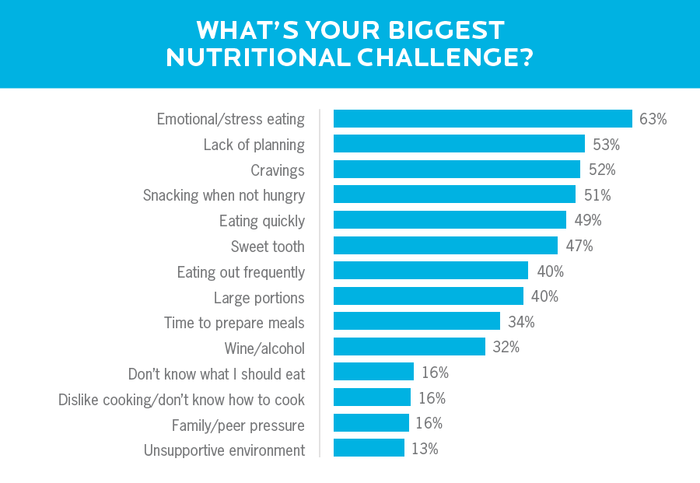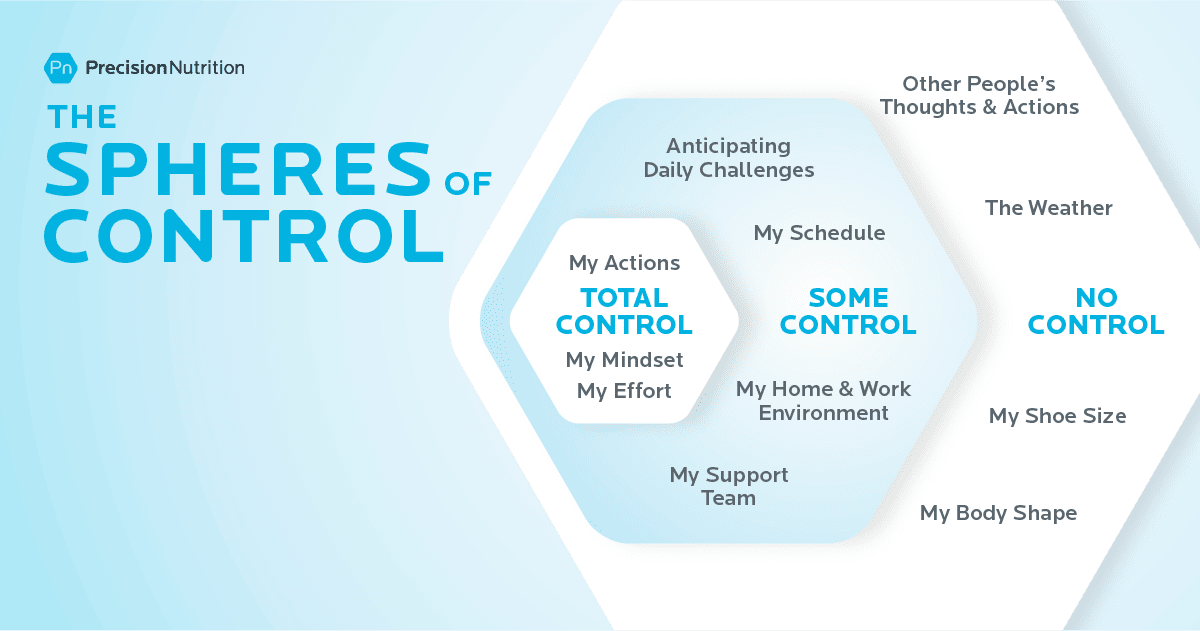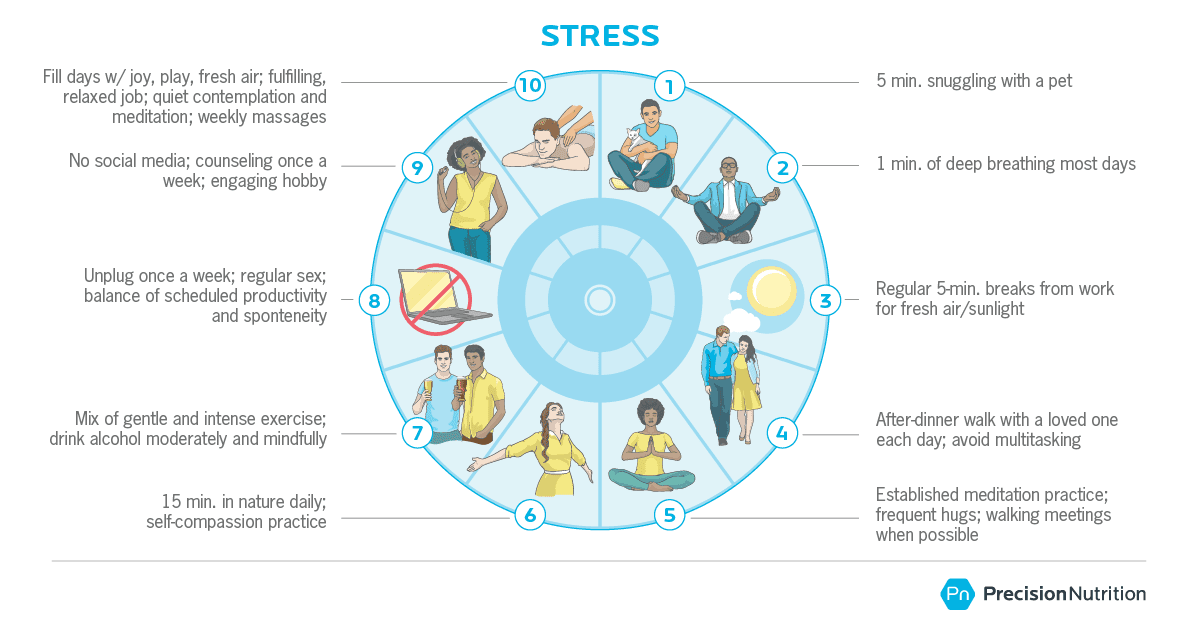The irony is that it’s kind of stressful to find answers about stress.
There’s so much conflicting information out there.
But if you’re a health and fitness professional, your clients—maybe even your friends and loved ones too—will likely turn to YOU for counsel.
They’ll ask things like:
“Is stress REALLY toxic?”
“Do you think stress caused this belly fat I can’t lose?”
And:
“Are these red bumps from stress?”
(Why does everyone insist on showing you their rashes??)
You want to help, but coming up with the right answers can be hard, because:
The right answer depends.
It depends on WHO the asker is, WHAT their goals are, WHERE they’re starting from, and HOW MUCH they’re willing and able to change
The truth is, one-size-fits-all answers to stress-related questions don’t exist.
However, you can build a strong foundation of knowledge about stress that can help you answer these questions with more confidence and expertise.
In this article, we’ll try to give you some resources to do that.
If you want, read the following Q and As from top to bottom. Or, just jump to the ones that interest you the most:
Question #1. Is stress really bad for you?
Question #2. What are the signs of stress?
Question #3. Is stress making me gain / lose weight?
Question #4. How can I stop stress eating?
Question #5. How do I get rid of stress?
Question #6. How do I fit in stress-management strategies and self-care?
Question #7. Is there a diet that will help reduce stress?
Question #8. Is there any way to cool stress fast?
Question #1. Is stress BAD for you?
Yes and no. It’s all about the right amounts—for YOU.
The relationship between stress and health has gained a lot more attention and validity in the past 30 years.
As a result, you’ve likely learned to associate stress with all kinds of terrible things: heart attacks, hair loss, early death.
And while excessive, unrelenting stress definitely erodes health, let’s clear something up:
Not all stress is bad.
In fact, in order to thrive, we actually need some stress to feel juicy, purposeful, and alive.

As the above chart shows, it’s all about finding a stress “sweet spot.”
Go too far in either extreme, and you’ll feel crummy.
How do you find your stress “sweet spot”?
Stress that’s long-lasting, relentless, and demoralizing is also the kind of stress that’s associated with depression and anxiety, cardiovascular disease, diabetes, stroke, and cancer.1
If you’re dealing with those kinds of stressors, consider where you have control, and try to reduce—or even avoid—them when you can.
Also, ask for help. Sometimes having another person around to tackle a problem with you makes the difference between feeling like you’re drowning and feeling like you’ll make it to the shore.
On the flip side, when stress occurs in shorter bursts, and you feel like you have some control over it, as well as opportunities to recover in between, it can actually help you become stronger and more resilient over time.
This kind of stress tends to feel empowering: It helps build you up; not break you down.
One big complication…
What feels stressful is highly subjective.
Turns out, your perception of stress has a big impact on how stress feels—and what it does to your health.
If you believe stress is always terrible and should be avoided at all costs, you’ll be more likely to cling to your comfort zone, fear the future and what could happen, and steer clear of situations that could lead to growth.
(You’re also more likely to experience the negative health effects of stress, like high cortisol.2)
In a cruel self-fulfilling prophecy, stress actually does become more harmful.
However, if you believe stress can make you stronger, wiser, and more resilient, you’ll be more likely to proactively solve problems, seek out challenging experiences—and benefit from stress in your life.
Luckily, you have some control over your perception.
In the spirit of helping you shift your perspective, here are some examples of how some stress can actually enrich various aspects of life:



Choose to believe that stress has the capacity to benefit you. It can help you learn, grow, and live a bigger, more adventurous and meaningful life.
LEARN MORE:
Question #2. What are the signs of stress?
The signs and symptoms of stress depend a little on whether the stress is acute or chronic.
Acute stress (think: a car just swerved in front of you) generally causes your sympathetic nervous system to ramp up, which releases hormones such as epinephrine (adrenaline) and cortisol.
With acute stress, you might notice:
- Your heart beats a little faster
- Your breathing gets deeper and quicker
- You feel a burst of energy, alertness, giddiness, and/or focus
- You might feel a little shaky or even nauseous, if the stress was intense
The stress response is built-in. You don’t have to think consciously about it; your body just responds automatically in this way to all stressors.
Luckily, the recovery response is also built-in. Once a threat recedes, your heart rate and breathing will return to normal, and you’ll feel calm again.

Chronic stress is when that sympathetic activation lasts for days, weeks, or months, without adequate opportunities for recovery.
Just like a rollercoaster, stress can feel energizing in short bouts—but like a nauseating nightmare if you can’t get off the ride. Not surprisingly, chronic stress is more likely to take a toll on your physical and mental health.
Signs of chronic stress include:
- Excessive worrying or anxiety
- Low mood or energy
- Poor appetite, OR an increased desire to “stress eat”
- Digestive problems like heartburn or constipation
- Trouble sleeping
- Unfocused or foggy thinking
- Feeling isolated or irritable with others
- Frequent colds, flus, or infections
- Trouble recovering from workouts, or aches and pains in general
- Low sex drive
While the stress response is normal and helpful for short-lived bouts of challenge and excitement, we’re not meant to live in a constant state of activation and threat.
Stress feels best when it’s broken up with periods of recovery.
READ MORE:
The difference between stress and anxiety
Everyone experiences stress.
Most people will also experience anxiety.
(At least to some degree, at some point.)
Anxiety often involves physical symptoms—tension, increased heart rate, sweating.
But the hallmark aspect of anxiety is a persistent feeling of apprehension or dread.
Although this feeling sometimes seems like it arises from nowhere, it’s usually caused—and perpetuated—by negative thoughts and ruminations like, “I’m never going to get through this” or “Everyone is going to judge me.”
(Overly negative or catastrophic thoughts are also called “cognitive distortions.” Read more about how to deal with them here: The thought tool that can lower your stress instantly)
Stress usually starts in response to an event or situation, and ends when that situation has resolved.
But with anxiety, the “threat” tends to persist even beyond the scope or duration of the event.
While stress can trigger helpful adaptations, anxiety tends not to be super productive. In excess, it can feel pretty debilitating.
The good news
Many stress management techniques are also effective at reducing anxiety.
Journaling, exercise, social connection, and relaxation exercises like breathwork or positive visualization can help with both stress and anxiety.
However, if anxiety is especially intense, long-lasting, or interferes with your quality of life, it’s best to consult a healthcare professional like a therapist or a family doctor.
If you’re a coach, remember that you’re not qualified to diagnose or treat clinical anxiety or depression. If your client struggles with either, the best way you can support them is to refer out to a medical professional who specializes in mental health.
(Trying to help clients with their mental health? Read this first: “I’m a coach, not a therapist!” 9 ways to help people change while staying within your scope)
Question #3. Is stress making me gain / lose weight?
Possibly.
But more likely, stress is affecting your behaviors. And eating behaviors definitely affect body composition.
Here’s how it works
When you’re stressed, your physiology changes—at least temporarily.
Your body’s acute stress response and the accompanying spike in adrenaline releases stored glucose (sugar) into the bloodstream so you have energy to deal with whatever challenge you’re facing.
This increase in blood sugar can reduce your appetite, making you push away your sandwich even if you haven’t eaten all day.
The stress response also dampens digestion.
Even when you do eat, food might feel like it’s just sitting in your gut not moving anywhere, or it might blast through you so fast that you’re afraid to stray too far from a washroom. Because digestion is compromised, you also may not adequately absorb your food.
It’s through both loss of appetite and loss of absorption that some people lose weight during periods of stress.
On the other hand, weight gain during periods of stress is just as common.
Especially when stress becomes chronic, the stress hormone cortisol increases. Cortisol can increase appetite, especially for carbohydrate- and calorie-rich foods.3 4
Most people find eating pleasurable and soothing, so turning to food during times of stress is a common (and understandable) coping mechanism. Of course, when this becomes a habit, excess calories over time can lead to weight gain.
If that’s something you struggle with, check out the next answer below.
READ MORE:
Question #4. How can I stop stress eating?
More than 60 percent of our new clients list emotional or stress eating as a major nutrition challenge. What’s more, over 50 percent say they also “get intense cravings” and “snack when not hungry.”

If you relate, it might be a relief to know you’re not alone. Of course, that’s little consolation when your hands are fumbling for crumbs at the bottom of a freshly opened bag of peanut butter pretzel bites.
But what if you realized this behavior occurs…
- Every time your mom calls?
- On Sunday nights, when you’re dreading the start of a new week?
- Whenever you see, smell, or hear something that reminds you of your ex?
Emotional eating and intense cravings are typically part of a pattern of behavior that’s triggered by a specific experience—a thought, feeling, and/or situation.
If you can identify the trigger, you can disrupt the pattern of behavior and make different choices.
Use the “Break the chain” worksheet to help clients identify their emotional and stress eating triggers. Then, apply the step-by-step strategy at the end of it to create and strengthen alternative coping mechanisms.
READ MORE:
Question #5. How do I get rid of stress?
You’ll never entirely rid your life of stress.
Nor would you want to.
As we’ve mentioned, stress is a normal—even good—part of a full, meaningful life.
However, many of us end up with stress levels that feel overly disruptive or unhelpful.
Sometimes, that’s impossible to avoid. At some point, most people will face very difficult periods of unavoidable stress: illness, injuries, financial hardships, natural disasters, or a pandemic.
But often, you have some control. Maybe even more than you think.
At PN, we use an exercise called The Spheres of Control.
(If you want, fill out your own spheres of control using this free worksheet.)

With the Spheres of Control exercise, you identify what areas you truly have power over and focus more on them.
This often not only helps people feel less overwhelmed and stressed, but also more effective, capable, and in control.
What about those areas you have zero control over?
By seeing the reality on paper (or a screen), you can give yourself permission to stop wasting precious energy trying to control the uncontrollable. And that in itself can help relieve stress and anxiety.
READ MORE:
Question #6. How do I fit in self-care?
Sometimes, adding more recovery can be just as effective as reducing stress.
When you recover, you regain, restore, or recuperate what you’ve lost. And you return to your baseline state of wellbeing, health, and performance.
Sounds great, except… what if you feel like you don’t have time to ADD anything else, even if it’s good for you?
A paradigm shift that might help
Instead of looking at stress management as an “on” or “off” switch—you’re either doing ALL the things or NOTHING—think of it more like a “dial.”
The image below shows what stress recovery might look like on a continuum, from devoting five minutes a day to something restorative, all the way to basically making it your job to be a Master of Chill.
(If you want to see how this concept applies to other habits—like those related to nutrition or fitness—check out this infographic: Never press “pause” on your health and fitness again)

To apply this concept, start by identifying your baseline: Are your stress management practices currently at a 1 or 2? Or maybe even a 0?
If so, no judgment. This is just your starting point.
Think about what “a little better” might look like.
Even by one or two “notches.”
Might you add five minutes of journaling to your evening routine? Or a 10 minute walk to get some sun and fresh air in the morning? Consider what just a little better might look like, and start there.
For the extra frazzled, it might help to know that sometimes the BEST time to start a new habit is when you’re busiest.
If you can learn to fit stress management practices into your life when you’re swamped, it’ll feel like a breeze to keep them in there—or even build on them—when life settles down.
(And if life never settles down, at least you didn’t delay your self-care further waiting for the “perfect time.”)
READ MORE:
Question #7. Is there a diet that will help reduce stress?
All over the internet, you’ll find curative diets for stress and anxiety. They put food into neat little categories, and so long as you ONLY eat “do” foods—and judiciously eliminate “don’t” foods—your stress will go away.
If only feeling better were that simple.
Truth is, good mental health depends on many different nutrients from many different foods, as well as a set of fundamental nutrition principles, like:
- Getting enough energy (calories) to cover your energy needs
- Meeting macronutrient (proteins, carbohydrates, and fats) and micronutrient (vitamins, minerals, and phytonutrients) needs
- Drinking enough water
- Eating at regular times, whatever that means for you
- Consuming mostly minimally-processed foods (like fruits, vegetables, whole grains, legumes, nuts, seeds, animal proteins, and dairy)
- Eating slowly and mindfully
- Enjoying your food, and the company you share it with
Consistently neglecting the above can add stress.
Prioritizing them—which doesn’t mean doing them perfectly—is probably the most effective nutrition strategy to reduce stress.
If that list looks overwhelming, just start from wherever you are right now, and simply aim to eat “a little better.”
![Image shows a horizontal scale going from red (needs improvement) to green (doing awesome). If you are in the red, you may try aiming for orange or yellow, or just a little bit better, before you get to green.]](https://assets.precisionnutrition.com/2022/11/NutritionalSweetSpot_Revise2.png)
Choose one practice to work on from the above list, and in a couple of weeks, evaluate whether you’re ready to build on it.
Master the fundamentals, and you’ll see that they’re pretty effective on their own, no magic diet needed.
READ MORE:
Question #8. Is there a way to calm stress fast?
No matter what’s going on in your life, one of the most effective, accessible ways to cool stress FAST is simply to breathe.
Slow, deep breathing stimulates your vagus nerve (the main nerve of your “rest-and-digest” system), which can help relax your whole body.
In turn, this reduces not only your physiological response to stress but also your emotional response.
When you’re calmer and more relaxed, you make better decisions. You’re able to focus better. You feel more in control. And deliberate breathing techniques can help.
One breathing technique we like is called “Box breathing.” It breaks the breath cycle into four 4-second-long stages (like the four sides of a square).
Here’s how to do it
- Take a four-second inhale through your nose. But don’t just “breathe into your belly.” Try to pull the air into your chest and mid-back without letting your ribs flare out. (You’ll feel some tension in your abs.)
- Hold your inhale for four seconds.
- Exhale for four seconds. Imagine that you’re slowly blowing out a big sigh. Keep your body relaxed, but put a little tension into your abs so that you feel them pulling your ribs down and in, toward your spine.
- Hold your exhale for four seconds.
Repeat as many times as you’d like. (And feel better.)
READ MORE:
Stress is uncomfortable, but it also helps us grow.
If you’re stressed about answering your clients stress-related questions, think of it this way:
This is an opportunity to expand and deepen your knowledge and coaching skills.
(See? We’re applying a resilience-building mindset already!)
Being a coach who helps clients manage their stress involves, yes, knowing about stress.
But it also means being a fellow human who can relate to their struggles.
Alongside your clients, you can use your knowledge about stress and recovery to take on challenges, and grow into a better coach—and person—than you were before.
References
Click here to view the information sources referenced in this article.
If you’re a health and fitness pro…
Learning how to help clients manage stress and optimize sleep can massively change your clients’ results.
They’ll get “unstuck” and finally move forward—whether they want to eat better, move more, lose weight, or reclaim their health.
Plus, it’ll give you the confidence and credibility as a specialized coach who can solve the biggest problems blocking any clients’ progress.
The brand-new PN Level 1 Sleep, Stress Management, and Recovery Coaching Certification will show you how.

